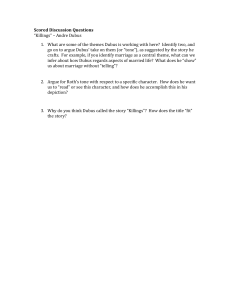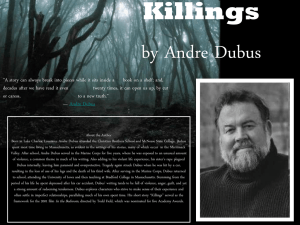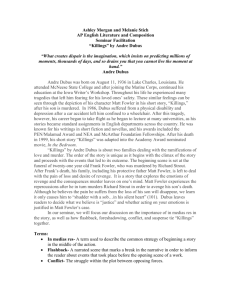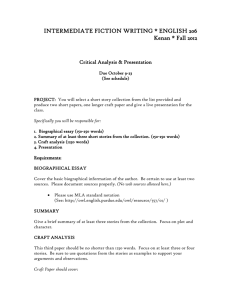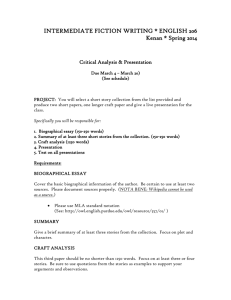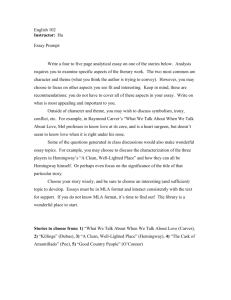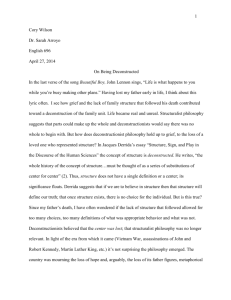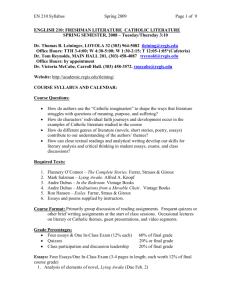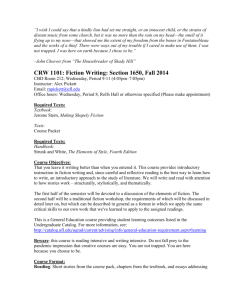The Art of Reading Andre Dubus: We Don't Have
advertisement
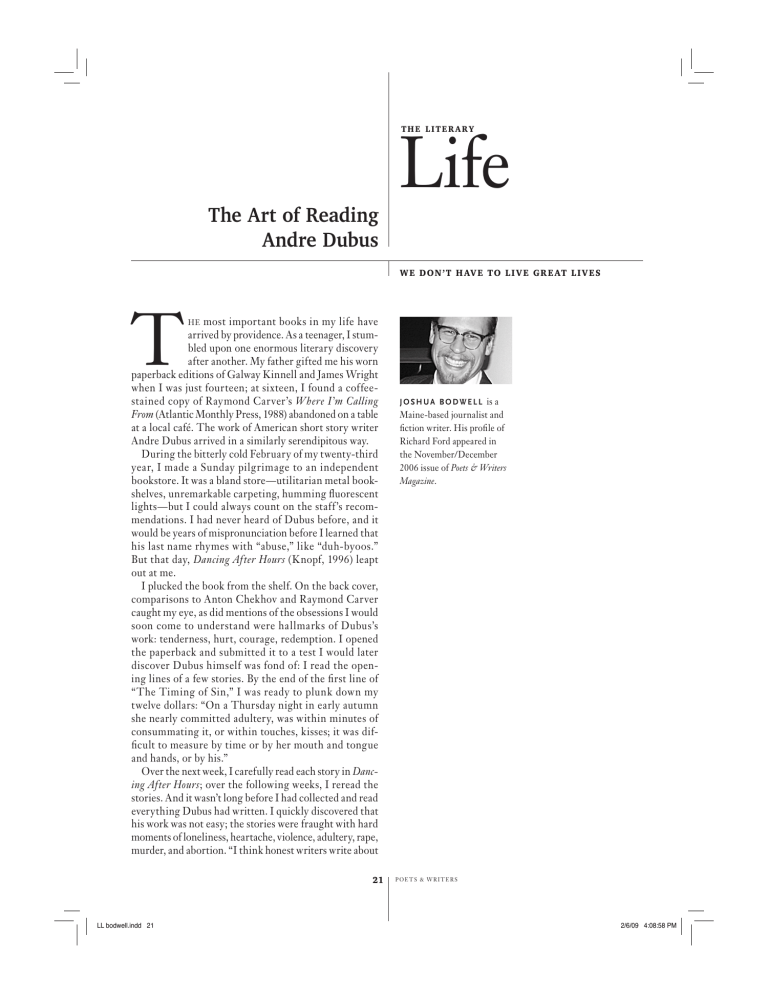
THE LITERARY Life The Art of Reading Andre Dubus W E D ON’ T H AV E T O L I V E GR E AT L I V E S T most important books in my life have arrived by providence. As a teenager, I stumbled upon one enormous literary discovery after another. My father gifted me his worn paperback editions of Galway Kinnell and James Wright when I was just fourteen; at sixteen, I found a coffeestained copy of Raymond Carver’s Where I’m Calling From (Atlantic Monthly Press, 1988) abandoned on a table at a local café. The work of American short story writer Andre Dubus arrived in a similarly serendipitous way. During the bitterly cold February of my twenty-third year, I made a Sunday pilgrimage to an independent bookstore. It was a bland store—utilitarian metal bookshelves, unremarkable carpeting, humming fluorescent lights—but I could always count on the staff’s recommendations. I had never heard of Dubus before, and it would be years of mispronunciation before I learned that his last name rhymes with “abuse,” like “duh-byoos.” But that day, Dancing After Hours (Knopf, 1996) leapt out at me. I plucked the book from the shelf. On the back cover, comparisons to Anton Chekhov and Raymond Carver caught my eye, as did mentions of the obsessions I would soon come to understand were hallmarks of Dubus’s work: tenderness, hurt, courage, redemption. I opened the paperback and submitted it to a test I would later discover Dubus himself was fond of: I read the opening lines of a few stories. By the end of the fi rst line of “The Timing of Sin,” I was ready to plunk down my twelve dollars: “On a Thursday night in early autumn she nearly committed adultery, was within minutes of consummating it, or within touches, kisses; it was difficult to measure by time or by her mouth and tongue and hands, or by his.” Over the next week, I carefully read each story in Dancing After Hours; over the following weeks, I reread the stories. And it wasn’t long before I had collected and read everything Dubus had written. I quickly discovered that his work was not easy; the stories were fraught with hard moments of loneliness, heartache, violence, adultery, rape, murder, and abortion. “I think honest writers write about HE 21 LL bodwell.indd 21 J O S H U A B O D W E L L is a Maine-based journalist and fiction writer. His profi le of Richard Ford appeared in the November/December 2006 issue of Poets & Writers Magazine. POETS & WRITERS 2/6/09 4:08:58 PM the literary life what bothers them,” Dubus once said of his choice of subject matter. Though some have found his narratives too dark or brooding, I was startled and impressed by the richness of the characters Dubus sketched. He populated his stories with complex characters that are neither all good nor all evil, neither all right nor all wrong— but none of them seemed completely beyond the possibility of redemption. This touch of kindheartedness amazed me. As I read, his characters became a part of my consciousness and my understanding of humanity: a young boy haunted by the urge to masturbate (“If They Knew Yvonne”); a young girl struggling with her weight (“The Fat Girl”); a wife caught in the moment of accepting and dealing with the consequences of her failed marriage (“Adultery”); a father hypnotized by the false hope promised by revenge (“Killings”); and another father, this one divorced, torn between doing what is “right” and protecting his daughter (“A Father’s Story”). With a delicate touch that many writers lack, Dubus could skim the surface of sentimentality even as he graced his characters with quiet dignity. I learned later that like so many of his inscrutable yet familiar characters, Dubus himself was a complex man. A thrice-divorced devout Catholic who fathered six children— including Andre Dubus III, the author of House of Sand and Fog (Norton, 1999)—by two women, Dubus was a barrel-chested ex-marine who liked a stiff drink and the occasional bar fight, but had a propensity to cry during schmaltzy movies. He could be distracted and distant at times, but many describe him as one of the most tender, sentimental people they’ve ever known. I understand now that his writing has been a twofold gift in my life. As a writer, the short stories taught me about compression and point of view, and as a human being they gave me a deeper understanding of empathy and compassion. P ERHAPS more than any other American writer of his generation, Andre Dubus was fiercely devoted to the short story. “I love short stories because I believe they are the way we live,” Dubus once wrote. “They are what our friends tell us, in their pain and joy, their passion and rage, their yearning and their cry against injustice.” While his stories would eventually earn him fellowships from the Guggenheim and MacArthur Foundations, as well as the PEN /Malamud Award, the Rea Award for the Short Story, the Jean Stein Award from the American Academy of Arts and Letters, and nominations for a National Book Critics Circle Award and a Pulitzer Prize, Dubus struggled to find a foothold in a publishing world dominated by novels. His devotion to the short story kept him off the best-seller list, and even today Dubus remains largely unknown to the general public, praised instead as a “writer’s writer.” New readers are likely to have discovered Dubus by way of In the Bedroom and We Don’t Live Here Anymore, two award-winning films adapted from his stories. Yet Dubus has influenced scores of today’s short story practitioners, including Chris Offutt, Robert Olmstead, Tobias Wolff, and Monica Wood, and is greatly admired by E. L. Doctorow, John Irving, Stephen King, Elmore Leonard, and John Updike. Born in Lake Charles, Louisiana, in the summer of 1936, Dubus was raised and schooled in the Catholic South. He remained involved with the church throughout his life, and religious themes are often reflected, along with his own personal experiences, in the moral and ethical dilemmas his characters struggle to navigate. Dubus told Walker Percy biographer Patrick Samway, in an interview published in America magazine in 1986, that he believed his Catholicism heightened his “sense of fascination and compassion.” If many people view the Catholic faith in black and white, Dubus saw it as multicolored. “If there were no sin, JULY AUGUST 2008 LL bodwell.indd 22 THE A RT OF R EA DING there wouldn’t be art,” he once quipped in an interview in Glimmer Train. Dubus was drawn to writing at an early age and reveled in the work of Joseph Conrad and Ernest Hemingway. He began publishing stories while attending McNeese State University in Lake Charles, Louisiana, and continued writing even after he joined the United States Marine Corps in 1958. When Dubus eventually realized he had become a marine to prove his manhood to his father, he left the military (where he had risen to the rank of captain) for the Iowa Writers’ Workshop. In Iowa, Dubus studied under Richard Yates and Kurt Vonnegut, two writers who would later become staunch supporters of his work. After earning his MFA in 1965, Dubus drew on the material he’d gathered during his years as a peacetime marine to write the only published novel of his thirty-year writing career: The Lieutenant (Dial Press, 1967). By the time he joined the faculty at Bradford College in Haverhill, Massachusetts, in 1966 (where he remained until his retirement in 1984), Dubus had discovered the Russian short story master Anton Chekhov. When he realized that Chekhov’s story “Peasants” managed to squeeze a year in the life of a poor Russian family into just thirty pages, Dubus became infatuated by the idea of condensing tales that were novelistic in scope into short stories or novellas. He trashed the second novel he had spent months writing and dedicated himself to the short story. “My conscience is Chekhov,” Dubus told interviewer Robert Nathan in the February 1977 issue of Bookletter. “I write with him on my shoulder.” Dubus’s prowess in narrative compression is legendary. Andre Dubus III has written that his father’s story “Waiting,” about the hollow ache experienced by a woman widowed by the Korean war, took fourteen months to write and was more than one hundred pages in early manuscript form. But when the story was published in the Paris Review, it spanned a mere seven pages. 22 2/6/09 4:08:59 PM courtesy of the estate of andre dubus the literary life Though Dubus slowed down his writing process in later years and wrote fewer drafts, he typically pared back his stories over the course of successive versions. After he had taken a piece t h rough as ma ny w rit ten drafts as he could, Dubus would read the story aloud into a tape recorder, a practice he began as a student in Iowa. Dubus said that listening to t hese record i ngs al lowed h im to catch details he had missed, such as repetitions and jarring rhythms. “It’s physical, less abstract, when you use your voice and ears,” Dubus said of his listening method in a 1998 Yale Review interview. Fiction writer Peter Orner remembers that Dubus had an astonishing capacit y for listening. Orner, the author of The Second Coming of Mavala Shikongo (Little, Brown, 2006), attended a weekly gathering of writers that Dubus hosted at his home every Thursday night during the later years of his life. “Andre led by listening—not talking, but listening,” Orner remembers. “I have never met anybody who listened like Andre. When you’d read a story on Thursday night, he’d lean back a little in his chair and close his eyes and listen so hard. I remember watching him listen and feeling ashamed I couldn’t listen like that.” Yet even as he whittled his stories down to their cores, Dubus infused them with both psychological breadth and emotional immediacy. Typically, he begins his stories on the cusp of a powerful incident in a character’s life, as in the first lines of “The Winter Father”: “The Jackmans’ marriage had been adulterous and violent, but in its last days, they became a couple again, as they might have if one of them were slowly dying.” Dubus moved beyond the old adage “show, don’t tell” to create his own authorial maxim: Don’t tell everything. His flowing, poetic sentences can rush through several years in three paragraphs before screeching to a halt and moving through a tenminute conversation with excruciating detail and insight. for compassion. His stories search deeper into the human soul t ha n ma ny w r iters dare reach. There are moment s when h is generosit y and tender ness ca n nea rly overwhelm the reader, and it is a testament to his narrative skill that the stories never collapse into sentimentality. Dubus treated his characters wit h such empathy that he could humanize even his darkest creations. His portrayal of Richard St rout, t he antagonist of “Killings” (and of the movie In the Bedroom), is a good example. After Strout shoots F r a n k Fo w l e r f o r sleeping with his exAndre Dubus at the Iowa Writers’ Workshop in 1963. wife, Frank’s father, As Dubus’s reputation grew, his Matt, kidnaps Strout with the intenstories were published in literary quar- tion of killing him to avenge his son’s terlies, from Black Warrior Review to murder. During the kidnapping, Dubus Ploughshares and the Paris Review, and describes, in agonizing detail, the mioccasionally in magazines such as nutiae of Strout’s tidy apartment: the Harper’s and the New Yorker. But even greaseless stovetop, the lack of dishes as major publishing houses waved book in the sink, and, in the bedroom, “the deals and big advances under his nose socks rolled, the underwear folded and in exchange for the promise of a novel, stacked.” By focusing on these surprisDubus remained steadfastly dedicated ingly common details in the midst of to the short story. It was no easy stand such an uncommon moment, the reader to take for a writer who wanted his sto- is allowed to see Strout as something ries published in book form. After the far deeper and more complex than a publication of The Lieutenant, Dubus stand-in for evil. Strout begins to look waited eight rejection-filled years be- a lot like Matt Fowler: an average man fore the Boston-based independent who is capable of horrific acts. It is a publisher David R. Godine published chilling revelation. his first stor y collection, Separate “How rare it is these days to encounFlights, in 1975. ter characters with wills, with a sense of choice,” John Updike wrote, in the mid-1980s, of Dubus’s work. Dubus NDRE Dubus was enamored with the human condition. trusted his characters so much that It is not only his devotion he gave his stories over to them. “My to the short story form that job is only to form the words on the earned him comparisons to his beloved page as the characters are performChekhov, but his boundless capacity ing their acts,” Dubus told the Yale A 23 LL bodwell.indd 23 THE A RT OF R EA DING POETS & WRITERS 2/6/09 4:08:59 PM the literary life THE A RT OF R EA DING Goss Press LONG TRAIL WINDING: NEW & COLLECTED UPSTATE STORIES ELISABETH STEVENS Ten strange fictions focus on the compelling power of place over people in the old towns, small villages and still-wild woodlands of Upstate New York. An isolated lake conceals a drowned village that haunts living settlers. The guilty narrator of a violent adventure admits: “When we came down from the mountain, we weren’t the same as when we came up.” RAGBAG ELISABETH STEVENS An inconsequential chapbook about insignificant challenges…Elisabeth Stevens has issues with rags, missing buttons, biting insects, an elastic sock. Can this writer-artist get a grip? www.gosspress.com Review. In fact, he claimed that he was so helplessly enslaved to the will of his characters that he rewrote the ending to “Miranda Over the Valley,” an excruciating story about abortion, three times in the hope that Miranda would act differently—but she would not. “I didn’t want Miranda to be so hard,” Dubus said, “but that was all she would do.” Miranda is one of many examples of Dubus’s uncanny ability to create female characters that seem as though they were written by a woman. Friend, admirer, and fellow short story devotee Tobias Wolff wrote in his afterword to Andre Dubus: Tributes (Xavier Review Press, 2001) that Dubus “wrote better about women than any man of his generation, both from their point of view and from without. Each of his women is particular and unexpected, her moral and physical nature without a shadow of male fantasy or condescension.” In “Out of the Snow,” for example, a wife speaks up when her well-meaning husband attempts to console her with a trite and simplistic notion of motherhood. In the story, two men follow LuAnn Arceneaux home from the grocery store and force their way into her kitchen. Dubus describes in visceral language how LuA nn savagely defends herself against what is surely an attempted rape. Later, LuAnn tells her husband how she is stunned by the violence she was capable of. Her husband explains it away as motherly instinct. “You had to,” he says. “For yourself. For the children. For me.” But Dubus does not allow LuAnn to be consoled by such a clichéd rationale—she interrupts her husband and tells him, “I didn’t hit those men so I could be alive for the children, or for you. I hit them so my blood would stay in my body; so I could keep breathing.” The fiction writer Ann Beattie has long admired Dubus and says his stories go far beyond simply giving female characters equal attention and power. “Dubus lets us watch fairly conventional power struggles between men and women work out unexpectedly,” JULY AUGUST 2008 31155GossPress.indd 1 LL bodwell.indd 24 Beattie says, “because there is always the inclusion of fate…everyone is swept up in something larger than any individual.” She believes Dubus gives men and women comparable authorit y and agency because “it’s not about who ‘wins,’ but rather it is a reality that the struggle is undertaken again and again; the stories are about how people must make accommodations once they find out there’s no winning. The external world, as Dubus sees it, is very grim,” Beattie says, “even with male and female characters who are articulate and who think they know what it is they want.” Time and again, Dubus explored how normal people struggled with the complexities of their desires. This subject lies at the heart of Voices From the Moon (Godine, 1984), his longest novella (it was actually marketed as a novel) and very likely his masterpiece. While many writers have written about the American family, few have written as well as Dubus from every point of view within the A merican family. He has inhabited his stories not only in the voices of sons and fathers (“If They Knew Yvonne” and “A Father’s Story”), but in those of mothers and daughters, too (“Leslie in California” and “In My Life”). In Voices From the Moon, Dubus, like William Faulkner in As I Lay Dying, uses all of these voices, examining the story’s central confl ict from multiple perspectives. The nine chapters of the 126-page novella alternate between the viewpoints of R ichie Stowe, a serious twelve-year-old who plans to become a priest, and the other members of the boy’s family. The story takes place over the course of a single day and is centered on the revelation that Richie’s divorced father plans to marry the ex-wife of Richie’s older brother—the father’s own former daughter-in-law. Such a plot could easily become soap opera, but with his plain language and astute characterization Dubus weaves a tale that leaves the reader feeling, if not affection, then at least empa24 5/20/08 10:05:16 AM 2/6/09 4:09:01 PM the literary life THE A RT OF R EA DING thy for every member of the family. I n Voices From the Moon, Dubus balances the themes and preoccupations that defi ne his oeuvre—religion, guilt, compassion, sex, spirituality, tenderness, acceptance, violence, and morality—and he does it from the shifting viewpoints of a father, son, mother, daughter, husband, wife, and lover. They are normal people doing mundane things, but while these characters might appear simple, they are not simpletons. Near the end of the story, Richie’s long-suffering mother voices what sound like some of Dubus’s own philosophies about people and life. In an attempt to comfort her eldest son, who is shocked and distressed that his own father Dubus in Haverhill, Massachusetts, in 1998. would marry his ex-wife, the mother explains that she likes her co- help, an oncoming car traveling nearly workers because they don’t have any sixty miles an hour struck Dubus and “delusions” about life. “We don’t have Luis. The young man, only twentyto live great lives,” she says, “we just three, was killed instantly. Dubus was have to understand and survive the thrown over the car’s hood and landed ones we’ve got.” This epiphany is the in a crumpled, bleeding mass on the kind of earnest, audacious blanket of other side—alive but with thirty-four grace that Dubus was never afraid to broken bones. Moments before the cast over his characters. impact, Dubus had pushed Luz out of harm’s way, likely saving her life. Yet he did so at great sacrifice: Dubus H E w inter I f irst read Dancing After Hours, I did lost his left leg below the knee and his not k now—and would right leg was crushed to the point of not unt il I bought his uselessness. The accident was a massive blow to collection of essays, Meditations From a Moveable Chair (Knopf, 1998)—that the ex-marine, who loved physical exDubus was bound to a wheelchair, a ercise (especially running and weight “cripple,” as he put it, for the last thir- lifting), and who was, in some ways, defined by his physicality. Two years later, teen years of his life. On July 23, 1986, while driving Dubus’s third wife left him and took home from Boston, Dubus stopped to their two young daughters with her. help Luz and Luis Santiago, a brother Overwhelmed and in continual pain, he and sister from Puerto Rico who had slipped into a dark depression and, for a collided with a motorcycle that had time, struggled to write fiction. Dubus slowly regained his confibeen abandoned on t he highway. While Dubus struggled to commu- dence by writing essays and through nicate with the Santiagos, usher the t he support he received from t he pair off the road, and flag down more writers who gathered every Thursday dr. edward j. gleason T 25 LL bodwell.indd 25 night at his house. When he did tackle fiction again, what he wrote—the stories that would become Dancing After Hours— could easily have spiraled into bitterness and self-pity. Instead, his work grew even more generous, more empathetic. A a year after I discovered Danci n g A f t e r H o u r s, I s le u t h e d o u t a mailing address for Dubus and wrote him a letter of gratitude. A few weeks later I learned that, at the age of sixty-two, Dubus had died of heart failure. The date was February 24, 1999. A month or so passed, and then a letter with the return address “Dubus” eerily appeared in my mailbox. I nervously opened it and found that it was from A nd re D ubu s I I I . He h ad written to say he had found my letter, and then he did a beautiful thing: He thanked me for thanking his dad. The first time I met Dubus III in person, he told me about the unexpected way his father had influenced his art. “It’s not his fine work,” he told me, “but seeing him walk daily into his downstairs study in our tiny rented house and try to write something beautiful for someone he would probably never even meet. It’s that image that gave me permission as a young man to view writing as a legitimate line of work to devote one’s life to.” Andre Dubus cared a great deal for people. There is no better evidence than the words he put to paper. The best of his work leaves us feeling uneasy and vulnerable from the shock of recognition—nervous that this man not only knows our secrets, but that he might understand them better than we do. Though Dubus himself may have been as complex as the characters he created, his stories offer what only great art can: They provide counsel for the heart. BOU T POETS & WRITERS 2/6/09 4:09:04 PM
